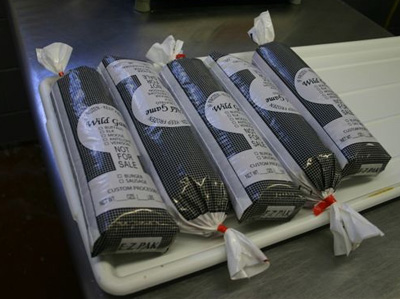Processed venison donated to charitable organizations
DOVER – DNREC’s Division of Fish & Wildlife announced today the private butcher shops and DNREC cooler locations that accept donated deer for the Sportsmen Against Hunger program during Delaware’s 2018/19 deer hunting season. Deer generously donated by successful deer hunters are processed into venison at no charge to the hunter, with the Division of Fish & Wildlife distributing the venison to charitable groups that provide meals for needy Delawareans.
Last year, DNREC’s Sportsmen Against Hunger program distributed 19,083 pounds of venison from 649 deer donated by hunters to approximately three dozen food pantries and shelters statewide, which provided 76,332 meals to Delawareans in need. Since it began in 1992, the program has provided more than two million such meals.
Successful hunters can take their deer directly to participating private butcher shops, or they may drop off their deer at any of DNREC’s walk-in coolers listed below.
Participating Butcher Shops
Sussex County
Dave’s Cut ‘Em Up
6854 Delmar Road
Delmar, DE 19940
302-381-7257
Kent County
Miller’s Butcher Shop
577 Morgans Choice Road
Wyoming, DE 19934
302-697-8278
D&J Custom Cutting
89 Myers Drive
Hartly, DE 19953
302-492-0323
New Castle County
Townsend Deer Butchering
1300 Dexter Corner Road
Townsend, DE 19734
302-378-3268
Cooler Locations to Donate Deer
Sussex County
Assawoman Wildlife Area
37604 Mulberry Landing Road
Frankford, DE 19945
Gumboro Community Center
36849 Millsboro Highway
Millsboro, DE 19966
Redden State Forest HQ
18074 Redden Forest Drive
Georgetown, DE 19947
Trap Pond State Park
33587 Bald Cypress Lane
Laurel, DE 19956
Kent County
Little Creek Wildlife Area
3018 Bayside Drive
Dover, DE 19901
Norman G. Wilder Wildlife Area
782 Kersey Road
Viola, DE 19979
Mosquito Control Office
1161 Airport Road
Milford, DE 19963
New Castle County
Augustine Wildlife Area
303 North Congress Street
Port Penn, DE 19731

Hunters donating deer are asked to call the phone number posted on the walk-in coolers so that the deer can be transported for processing in a timely manner. Hunters are reminded that all deer dropped off at a cooler must be field-dressed and registered by the hunter, with the registration number written on the field tag attached to the deer. Coolers are checked frequently, with donated deer taken to participating private butcher shops or the Sussex Correctional Institution’s deer butchering program for processing.
All deer harvested in Delaware, including donated deer, must be registered through the Division of Fish & Wildlife’s Hunter and Trapper Registration (HTR) system. Deer hunters are encouraged to access the system online using a smartphone, tablet, laptop, or desktop computer. Hunters who prefer to talk to a live customer service representative can call 855-DELHUNT (855-335-4868).
For more information on hunting in Delaware can be found at 2018-2019 Delaware Hunting and Trapping Guide. The guide also is available in printed form at DNREC’s Dover licensing desk in the Richardson & Robbins Building, 89 Kings Highway, Dover, DE 19901, and from license agents statewide.
For more information on the Sportsmen Against Hunger Program, please visit Sportsmen Against Hunger, or contact Bill Jones, regional wildlife manager, 302-284-4795. For deer hunting information, please contact Eric Ness, deer and furbearer biologist, at 302-735-3600.
Media Contact: Joanna Wilson, DNREC Public Affairs, 302-739-9902.